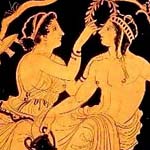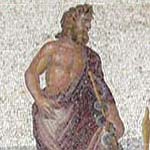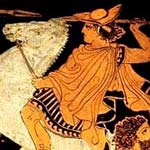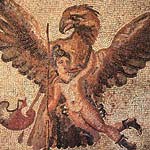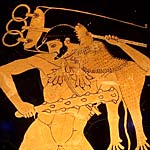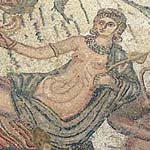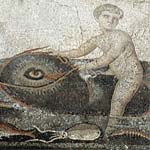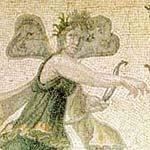DEIFIED MORTALS
The Greek pantheon of gods included mortal-born heroes and heroines who were elevated to godhood through a process which the Greeks termed apotheosis. Some of these received the privilege as a reward for their benefactions to mankind--e.g. Heracles, Asclepius and Aristaeus--, others through marriage to gods--e.g. Ariadne, Tithonus and Psyche--, and some by luck or pure chance--e.g Glaucus.
A COMPLETE LIST OF DEIFIED MEN AND WOMEN
AEACUS (Aiakos) A King of the Greek island of Aigina. After death he was appointed as a Judge of the Dead in the Underworld.
AEOLUS (Aiolos) A King of Thessaly. He was made King of the Winds by Zeus, which he kept locked away inside the floating island of Aiolia. Some say the King and the god were different persons.
ALABANDUS (Alabandos) A hero of the town of Alabandus (in Asia Minor) who became a god.
AMPHIARAUS (Amphiaraos) An Argive Seer and one of the warriors of the Seven Against Thebes. When he fled the battle after the army's rout, the earth gaped open and swallowed him up. He was transformed into the prophetic spirit of a subterranean oracle.
ARIADNE A Princess of Crete, who was abandoned by Theseus on the island of Naxos, where the god Dionysos discovered her and made her his wife. Ariadne was brought Olympos as the immortal spouse of the god. Some say he first had to recover her from Hades after her mortal death.
ARISTAEUS (Aristaios) A rustic Thessalian hero who invented the art of bee-keeping, manufacture of olive-oil and hunting and herding techniques. He also summoned the Etesian winds to end the scorching heat of the midsummer months. As a reward for his benefactions Aristaeus was awarded immortality as a god in the retinue of Dionysus.
ASCLEPIUS (Asklepios) A Thessalian physician whose exceptional skill allowed him to restore the dead. However, as this was contrary to the natural order of things, Zeus struck him down with a thunderbolt. He was later recovered by his father Apollo from the land of the dead and entered Olympus as a god.
ATTIS A youth loved by the goddess Cybele. When he betrayed her love she caused him to castrate himself in a fit of madness. He was later granted immortality as her eunuch attendant.
AUTONOE The Theban wife of the rustic hero Aristaeus, and a nurse of the god Dionysus. She was granted immortality like her husband and sisters, Ino (Leukothea) and Semele (Thyone).
BOLINA An Achaean woman loved by the god Apollo and granted immortality.
BRITOMARTIS A Cretan nymph who leapt into the sea to escape the lustful pursuit of King Minos. When she reached the mainland Britomartis joined the company of Artemis and was granted immortality by the goddess. (Some say Britomartis was immortal born.)
DAEMONES GOLDEN (Daimones Khryseoi) The men of the Golden Age were transformed into good spirits which inhabited the air after death. They were apponited to watch over the actions of men, reporting injustices to Zeus.
DAEMONES SILVER (Daimones Argyreoi) The men of the Silver Age were granted immortality after earth-dwelling fertility spirits after death.
DIONYSUS (Dionysos) The god of wine was sometimes described as a mortal-born hero who underwent apotheosis.
DIOSCURI (Dioskouroi) Twin Spartan heroes named Castor and Polydeuces. When Polydeuces was granted immortality by his father Zeus, he insisted on sharing the privelege with his mortal-sired twin brother Castor. The god agreed, but the pair had to divide their time between heaven and the underworld as a result. The Dioscuri were the patron gods of horsemen and the Games, and protectors of sailors who appeared at sea in the form of Saint Elmo's Fire.
ENDYMION A King of Elis loved by the moon-goddess Selene. He was granted immortality as her consort, but for the price of eternal sleep.
EPAPHUS (Epaphos) The Egyptian-born son of the nymph Io. He was stolen by the Titan-gods, but his mother eventually found him and secured the throne of Egypt for the boy. The pair were granted immortality as the Egyptian gods Isis and Osiris.
EPIONE Wife of the physician Asclepius. She was granted immortality along with her husband and became the goddess of the soothing of pain.
GANYMEDE (Ganymedes) A handsome, young Trojan prince caught up to Olympus by the god Zeus who admired him for his beauty. Ganymede was made the cup-bearer of the gods.
GLAUCUS (Glaukos) A fisherman from the Boeotian town of Anthedon. After eating a magical herb he found growing on the sea-shore, Glaucus was transformed into a fish-tailed sea-god.
HECAERGE (Hekaerge) A Hyperborean companion of the goddess Artemis. She died prematurely, but was restored by the goddess and made immortal.
HELEN (Helene) The queen of Sparta abducted by Paris of Troy. She and her husband Menelaus were granted immortality and transferred the paradisal realm of Elysium.
HELLE A Boeotian princess who escaped sacrifice with her brother on the back of a flying ram. She slipped from its back into the Hellespont sea where she was rescued and granted immortality by the god Poseidon.
HEMITHEA An Aegean princess, known as Molpadia in life. She leapt into the sea to escape her angry father and was transformed into a maiden goddess by Apollo.
HERACLES (Herakles) The greatest of the Greek heroes. As he was burning on the funeral pyre, the goddess Athena descended from heaven and caught him up in her chariot, transporting him to the company of the gods on Olympus. There he wed the goddess Hebe and was appointed guardian of heavenly gates.os. He was widely worshipped as a god throughout historic Greece.
HYACINTHUS (Hyakinthos) A beautiful Spartan prince loved by the god Apollon. Some say, after his premature death, he was transported by the Fates to Olympus.
IASION A Samothrakian prince loved by the goddess Demeter. Zeus slew him with a thunderbolt when he learned of the affiar, but the hero was (probably) restored by Persephone.
IO An Argive princess loved by the god Zeus. She was tormented by Hera who forced her to wander the earth in the form of a heifer, pursued by a stinging gadfly. Upon reaching Egypt Zeus restored her human form and transformed her into the goddess Isis. Her son by the god was the sacred bull-god Apis.
LEUCIPPIDES (Leukippides) Two Messenian princesses who were abducted by the Dioscuri twins. When their husbands were granted immortality they received the same privilege.
LEUCOTHEA (Leukothea) A Theban princess, formerly known as Ino. She and her husband Athamas were foster-parents of the god Dionysus. When Hera learned of this, she drove Athamas into a murderous frenzy, and Ino ws forced to flee, leaping with her son Melicertes into the sea. The pair were transformed by Zeus into sea-gods.
LOXO A Hyperborean maiden granted immortality by her mistress, the goddess Artemis.
MINOS A King of the island of Crete. After death he was appointed as a Judge of the Dead in the Underworld, alongside Aeacus and Rhadamanthys.
OPIS (Oupis) A Hyperborean maiden made immortal by her mistress, the goddess Artemis.
OREITHYIA An Athenian princess who was abducted to Thrace by the god of the north wind, Boreas, and there made his immortal wife.
PALAEMON (Palaimon) A Theban prince, formerly named Melicertes,. His father Athamas was driven into a murderous frenzy by the goddess Hera when she learned that Dionysus had been entrusted to his care. Melicertes' mother fled with the boy in her arms and leapt into the sea where the pair were tranformed into marine divnities by sympathetic gods.
PARTHENOS An Aegean princes who leapt into the sea to escape the murderous wrath of her father. She and her sister were transformed into maiden goddesses by Apollo.
PHAETHON A handsome young son of the dawn-goddess Eos. He was abducted by Aphrodite who transformed into an immortal daemon, the god of the star of Jupiter.
PHYLONOE A Spartan princess granted immortality after her premature death whilst in the service of the goddess Artemis.
POLYBOEA (Polyboia) A Spartan maiden who was carried up to heaven by the goddess Fates, along with her brother Hyacinthus.
PSYCHE (Psykhe) A princess loved by Eros, the god of love. Her stepmother, Aphrodite, imposed many difficult trials upon the girl, before she was accepted and welcomed amongst the gods as the wife of Eros.
RHADAMANTHYS A Cretan lawmaker who was granted immortality as the King of Elysium, and Judge of the Dead.
SISYPHUS (Sisyphos) A Corinthian king who tried to cheat death, first by escaping from the Underworld, and then by capturing the spirit of Death himself. The wicked man was eventually recaptured and sentenced to eternal torture in the Dungeons of the Damned. (N.B. Like Tantalus, he may have achieved his desired immortality, against the will of the gods.)
TANTALUS (Tantalos) A Lydian king who was favoured by the gods and invited to dine at their table. But after he stole ambrosia and nectar, he was condemned to spend eternity tortured in the Dungeons of the Damned. (N.B. The theft of ambrosia, literally "immortality," suggests he cheated death. Cf. Sisyphus.)
TENNES A hero of the island of Tenedos who was elevated to godhood after his death.
THYONE A Theban princess, originally named Semele. She was loved by the god Zeus, but destroyed by the god's lightning bolts when Hera tricked her into making the god promise to appear before her in his full glory. Her son, the god Dionysus, later recovered her from Hades and she was welcomed amongst the gods of Olympus.
TITHONUS (Tithonos) A handsome Trojan prince abducted by the goddess Eos. Zeus granted him immortality, but Eos forgot to request eternal youth and her husband quickly shrivelled up with old age.
TRIPTOLEMUS (Triptolemos) An Eleusinian prince and attendant of the goddess Demeter who was appointed with the task of instructing mankind in the art of agriculture. He was afterwards granted immortality by the goddess as a deity of her Eleusinian Mysteries.
TROPHONIUS (Trophonios) A Minyan hero who was swallowed up by the earth, and transformed into the immortal daemon (spirit) of a subterranean Boeotian oracle. He was similar to Amphiaraus (above).
SELECTED EXTRACTS FROM GREEK & ROMAN WRITERS ON APOTHEOSIS
Pausanias, Description of Greece 8. 2. 3 (trans. Jones) :
"Men of those days [the mythical age of heroes], because of their righteousness and piety, were guests of
the gods, eating at the same boar ; the good were openly honored by the gods, and sinners were openly visited
with their wrath. Nay, in those days men were changed to gods, who down to the present day have honors paid to
them--Aristaeus, Britomartis of Crete, Heracles the son of Alcmena, Amphiaraus the son of Oicles, and besides
these Polydeuces and Castor."
Cicero, On the Nature of the Gods 2. 24 (trans. Rackham) :
"Human experience moreover and general custom have made it a practise to confer the deification of renown
and gratitude upon distinguished benefactors. This is the origin of Hercules [Heracles], of Castor and Pollux
[the Dioscuri], of Aesculapius [Asclepius], and also of Liber [Dionysus] (I mean Liber the son of Semele . . .
and this is also the origin of Romulus, who is believed to be the same as Quirinus. And these benefactors were
duly deemed divine, as being both supremely good and immortal, because their souls survived and enjoyed eternal
life."
Cicero, On the Nature of the Gods 3. 15 :
"In Greece they worship a number of deified human beings, Alabandus at Alabanda, Tennes at Tenedos,
Leucothea, formerly Ino, and her son Palaemon throughout the whole of Greece, as also Hercules [Heracles],
Aesculapius [Asclepius], the sons of Tyndareus [Dioscuri]; and with our own people Romulus and many others, who
are believed to have been admitted to the celestial citizenship in recent times."
